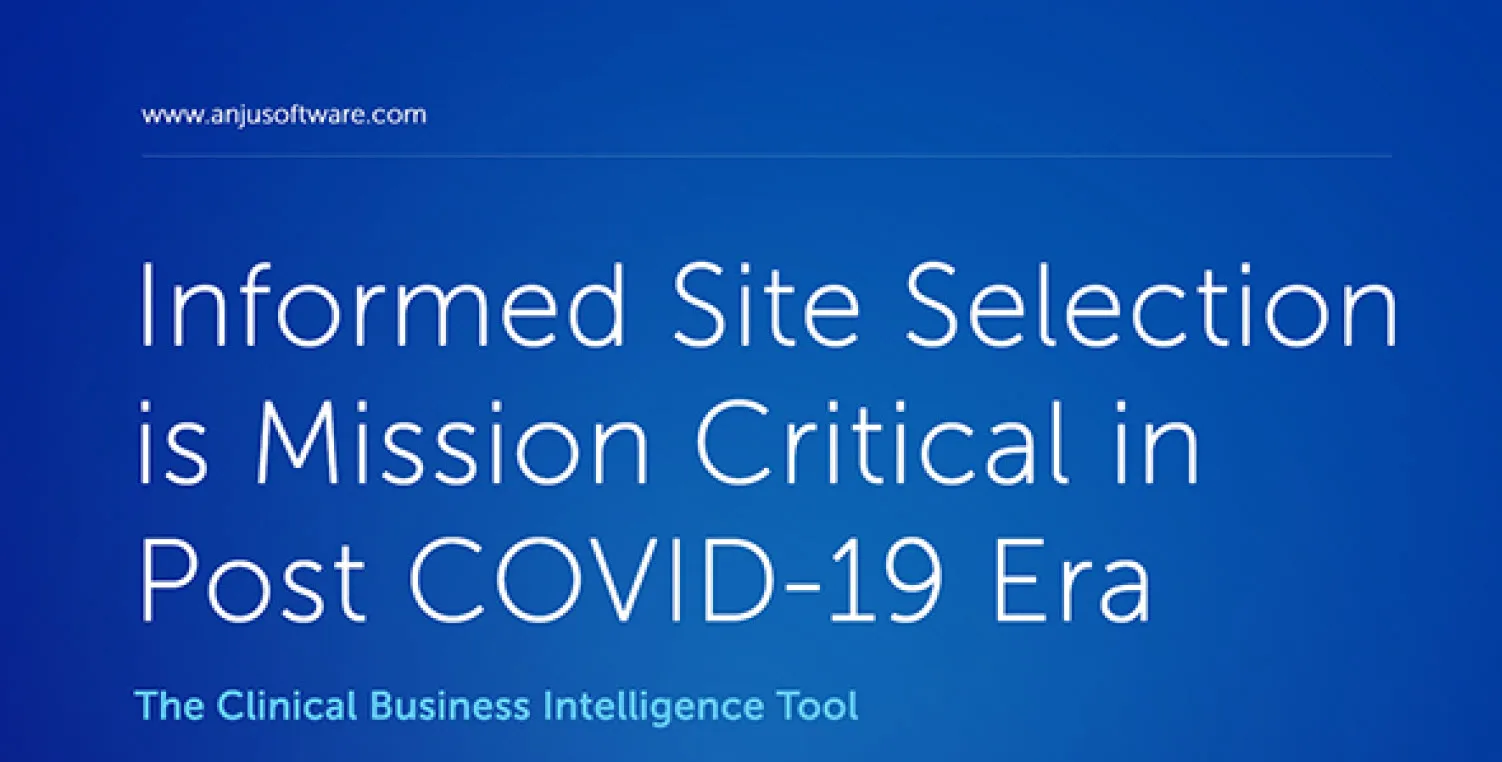Today’s New Normal
There is no getting around the “new normal.” The impact of COVID-19 can be felt across businesses in every corner of the globe. New processes and procedures. Adjustments to just about every aspect of doing business during this disruption. Even the life science industry was not spared. Many clinical trials have been paused due to the fear of spreading this virus, and others because they have been deprioritized as some investigators are shifting over to care for COVID-19 infected patients and their discovery trials. Even ongoing studies are
encountering slight shifts. Shelter-at-home policies with widespread quarantines have forced many sites to refocus on urgent patient care or even to shut down. Face-to-face interactions are limited, entering facilities can be discouraged in
some cases and keeping patients safe becomes a priority which forces sponsors and sites to modify their current protocols. Due to all these changes, clinical trials using hospitals as their research sites may now have to find new locations due to the influx of COVID-19 patients and new trials, planned to start by the time the clinical landscape is starting up again.1, 2
According to Global Data Pharma Intelligence Center, 67.3% of clinical trials were disrupted due to the suspension of enrollment. 18.4% had a delayed initiation of planned trials, and 14.4% of trials are currently being impacted due to slow enrollment. Within the 14.4% of trials affected by slow enrollment, 20.7% of these are specifically due to the lack of site and investigator availability.3
Due to all these unexpected shifts and challenges the world is now facing, many large pharma and biotech such as Pfizer, Eli Lilly, and Bristol-Myers Squibb have announced trial delays. Covid-19 has changed business as we know it and will undoubtedly have a ripple effect on common practices and policies in the clinical environment moving forward.
The Future Is Now – Prepare to Restart Your Trial
Learning to move forward while facing today’s challenges may not be easy, but finding the right clinical business intelligence platform is critical in restarting your trial using the most updated data. Anju Software’s ta-Scan can help you gain insight and make smarter decisions, enabling you to plan for success. Understanding your competitive landscape is essential to the success of your trial. By offering you analysis and visualization tools, ta-Scan helps you to make better, data-driven decisions. You can use ta-Scan to identify your competitive landscape on a global, country, regional and even site level with comprehensive maps and dashboards to identify site capacity issues and find rescue sites. Or run country and site enrollment simulations to organize recruitment protocols and optimize site and investigator selection. The platform also allows you to identify and track active investigators in numerous therapeutic areas, such as COVID-19, based on their clinical footprint and experience levels.
As an example for best practice, all clinical trials should include a feasibility analysis to verify that your study will not get derailed due to the competition that you’re facing. As seen below (diagram 1), ta-Scan is able to utilize its trial feasibility analysis help prevent mistakes in your site selection that can affect the total outcome of your clinical trial.
Why is this so important?
The reason that a trial feasibility analysis is vital to the success in the trial planning stage is that it can prevent early termination based on badly selected sites and countries for your trial. Sometimes what is expected and what actually happens are very different. In this case, the study was terminated 2 years ahead of schedule.

Diagram 1
Could this have been foreseen and prevented?
As seen below (Diagram 2), by running a simulation in ta-Scan’s trial feasibility tool with the original trial parameters, only 70% of the patient pool would have been realistic to enroll in the original country selection and only with a significant increase of sites to be opened, compared to the original site selection. The outcome of the feasibility analysis with the original parameters therefore match with the results witnessed by the sponsors, aggressive site addition and enrollment deficits which resulted in the termination of the trial. The trial feasibility analysis will at a minimum allow you to make better informed decisions to help save time and money.

Diagram 2
The Stakes Have Never Been Higher in the Post COVID-19 Era
If we’ve learned anything from COVID-19, it is that preparedness is essential, and that’s where ta-Scan comes in. It’s a cloudbased, semantically linked clinical business intelligence platform that connects data from thousands of sources covering various data classes (clinical trial registries, literature abstracts, conference abstracts, hospital registries, FDA, EMA, KEGG, etc.).
The ta-Scan platform provides a unique and user-friendly way to evaluate clinically relevant data at any desired level of detail: clinical trial data, site information, expert profiles, publications, geographical mapping, competitive analysis, etc.
Your studies might have been put on hold, but not your clinical business insights. Rather than working in the dark, now is the time to shine a light on all the ways you can best prepare for when your clinical trials start up again with ta-Scan. So you can keep focusing on what matters: timely bringing new, essential drugs and therapies to market for the patients who need it, and crucially, keep treating those patients whose current health is in the hands of study sponsors and sites.
For more information, please contact marketing@anjusoftware.com
Sources
1 – Biopharmadive.com, ‘A guide to clinical trials disrupted by the coronavirus pandemic’
https://www.biopharmadive.com/news/coronavirus-clinical-trial-disruption-biotech-pharma/574609/
2 – Nature.com, April 8, 2020, ‘COVID-19 brings drug development to a halt’, https://www.nature.com/articles/d41573-020-00069-1
3 – Clinicaltrialsarena.com, April 16, ‘Disrupted Clinical Trials Due to Covid-19’,
https://www.clinicaltrialsarena.com/comment/disrupted-clinical-trials-due-to-covid-19/
